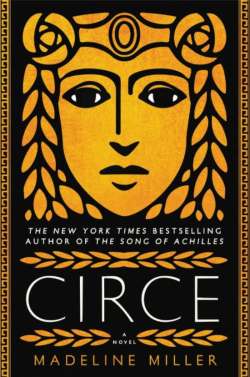
by Madeline Miller
Little, Brown and Company, 2018
I have a difficult time imagining how any book will be able to unseat Madeline Miller’s Circe as my favorite book of the year. It’s lyrical and poetic, intimate and grand in scope, human and godly, challenging and comforting. It’s wise. It’s profound.
It fulfills all the hopes I had for Ms. Miller’s work after her astounding first novel.
Where The Song of Achilles is her reinterpretation of The Iliad, Circe is a looser, more oblique riff on The Odyssey. Told from the first person perspective of the titular character, the work spans centuries and is filled with famous characters from throughout ancient Greek lore: Titans and Olympian gods, Scylla, King Minos and the Minotaur, Daedalus, Jason and Medea, and, of course, Odysseus, Penelope, and Telemachus all make appearances. It begins with Prometheus stealing fire and ends with the aftermath of Odysseus’ death. The largest part is taken up with Circe’s relationship with Odysseus and what happens after.
It’s remarkable how grand the scope of this story is, given that Circe is exiled on a small remote island for 80% of it. It’s remarkable how deeply Ms. Miller explores human nature through a character who’s a god and not really human at all.
In my review of The Song of Achilles, I remarked how powerfully Ms. Miller captures the alien-ness of Bronze Age Greece without modernizing it or trying to make it more palatable for modern readers. Circe is different: it’s not that the author modernizes this world in any way, nor that she attempts to make it palatable, but rather because of the basic premise—like The Odyssey, this is a world of magic, gods, and monsters. It exists in the realm of the fantastical, which feels more or less familiar to those of us who read modern fantasy or who were raised on the Greek myths and fairy tales.
The world in The Song of Achilles is very different than our own but still eminently human—it’s the contrast between that ancient world and ours that strikes you. In Circe, the world is less human and therefore one expects it to feel alien. The contrast is less striking. Which, again, makes it all the more remarkable how profoundly this story examines what it means to be human.
Much has already been made of Ms. Miller’s lyrical writing style and much more will be made of it in the wake of her second novel. Her work is poetic. There’s a gentleness to her words that wraps you, enraptures you, comforts you. And yet, this work is strong, defiant, unbending, unflinching. She deals with powerful, difficult themes in language that cradles you.
Mostly, I’m in awe of her ability to construct characters: Circe is strong, complex, sympathetic, relatable, but also deeply flawed, arrogant, mistaken, sometimes cruel. Every character in this work is similarly complex. It’s remarkable how she can use this one character—a goddess, no less, not even human—isolated on a small island, to weave a richly immersive tapestry of humanity.
Circe is a masterfully crafted jewel of a book. It’s nearly perfect. A fully worthy successor to The Song of Achilles.
An irony of works which approach perfection is that even insignificant flaws become glaring. Aspects of the work which aren’t flaws at all, but merely less than perfect, come to look like faults. Circe is a nearly perfect work but it’s not flawless.
The novel is slightly longer than it needs to be. There are a couple of sections which could be tightened up a notch—a couple sections where my mind started to feel the beginnings of an itch to wander away from the page.
Much of Ms. Miller’s genius lies in the effortless lyricism of her writing but there are a couple passages that show a hint of effort. There are high expectations for this second novel: given her achievement with The Song of Achilles, her poetic style, the depth of her understanding of the ancient Mediterranean world, her insight into the massive themes these stories grapple with—readers come to Circe expecting wisdom, expecting it to tell us something profound. It’s clear Ms. Miller is aware of these expectations and there are a couple of passages that read as though she tried to make sure she met them. These couple of passages come off as bit too self-conscious.
These are such minor issues they wouldn’t even merit mention in a less meritorious work. Circe fulfills the expectations I had for it and cements Ms. Miller as a writer of deep insight and compassion, with a masterful style.
It’s a nearly perfect novel.
I will read it for sure. Thanks.
LikeLike
Totally agree – this is definitely my favorite read of the year and I don’t think anything will top it!
LikeLike